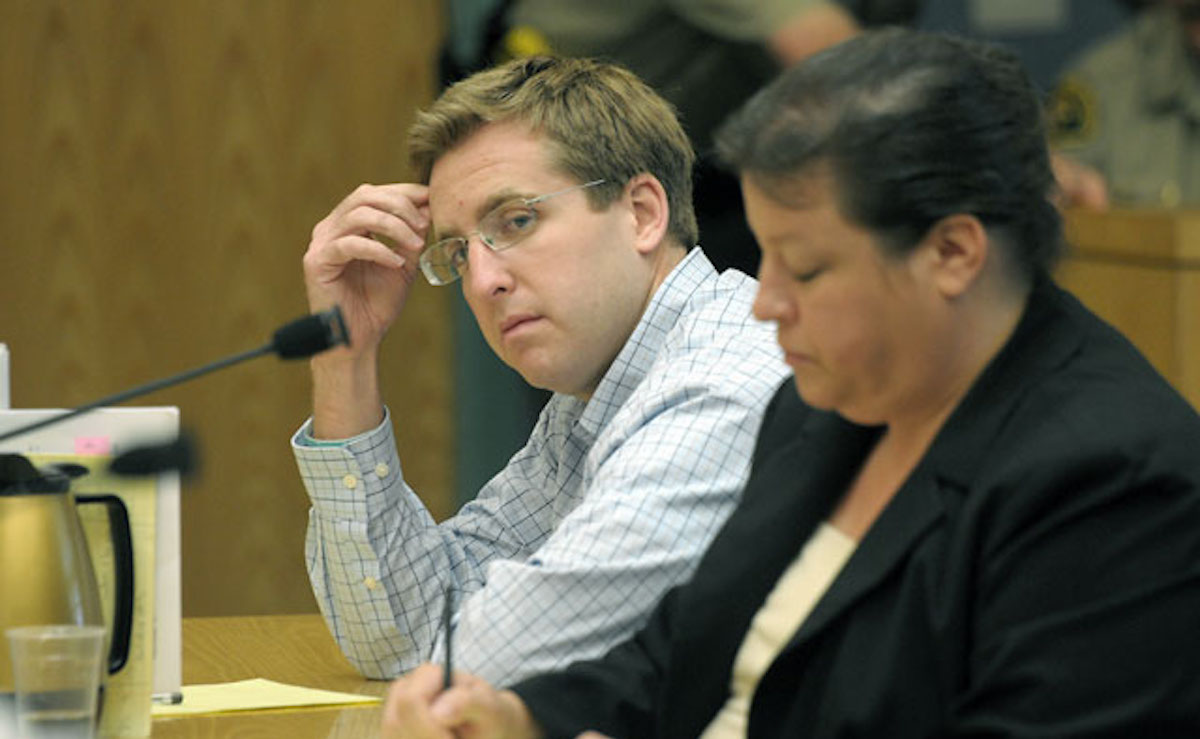Testimony Wrap-Up: Isla Vista Killer David Attias’s Petition to Restore Sanity
Santa Barbara Judge Thomas Adams Will Decide Whether Attias Is Ready for Unconditional Release

Witness testimony concluded last week in the unique case of David Attias — who was committed to Patton State Hospital for 10 years after plowing his car through a busy Isla Vista street in 2001, ultimately killing five people. In 2012, Attias was released to CONREP, a conditional release program that requires him to attend regular therapy and group sessions, and to be subject to random drug tests and at-home visits.
The trial began in February, nearly 21 years to the day after his original crime. Attias filed the petition, with defense attorney Jack Earley building the case that Attias has not presented any symptoms of his bipolar disorder for two decades and alleging that the restrictions of his program are holding him back from job opportunities and other areas of his personal life.
Earley’s witnesses were Attias’s father, girlfriend, and several doctors claiming that his mental disorder diagnosis was inaccurate. Forensic psychologist Lisa Hazelwood met with Attias via Zoom for a four-hour session, and in her report she claimed that Attias’s mental break at the time of the crime could have been a drug-induced psychosis, though he stopped using heavy drugs days before the killings and a toxicology report found only low levels of marijuana and lidocaine in his system at the time of his arrest.
Deputy District Attorney Maggie Charles was the prosecutor for the trial and picked holes through the defense’s witness testimony, pointing out that the three doctors who testified that CONREP had missed the diagnosis had only met with Attias briefly — if at all — in preparation for the trial, and that they been paid a combined $40,000 by the defense in fees for their time.
On the final day of testimony, Charles called the psychologist that is currently working with Attias through CONREP in Ventura County, Linh Chi. She corroborated what the other CONREP clinicians testified, that although Attias had made progress and showed an effort to acknowledge his stressors and triggers, he was not nearly ready for a full restoration of sanity.
She was the third forensic psychologist that worked with Attias through CONREP that testified the same, each describing several setbacks and red flags that prevented him from progressing through the program’s designed discharge process. CONREP applies five levels of care, starting with intensive, then moving to intermediate, supportive, transitional, and eventually aftercare. Patients enrolled in the program begin with almost daily contact, and the level of care is stepped down each time.
Sign up for Indy Today to receive fresh news from Independent.com, in your inbox, every morning.
Attias has spent the better part of the past 10 years bouncing between the intermediate and supportive levels of care, never seeming to break through to transitional and aftercare. His CONREP psychologists stand by his bipolar diagnosis, saying that his consistent therapy and medications have kept him from presenting any extreme episodes, but they point to his inability to buy into the full process as a major obstacle to his discharge from the program.
In court, Attias himself testified to having a difficult personality, which “ruffled feathers sometimes.” When describing a confrontation with a coworker that led to him being transferred to another store, Attias claimed that he “didn’t like her tone of voice.”
Earley’s open-ended questions drew a flurry of objections from the prosecutor: vague, argumentative, calls for speculation. Judge Adams at one point asked him not to “muddy the waters” by conflating two scenarios that seemed to confuse the witness. When questioning Chi, he built the case that everybody has “flavors” that make them a unique person, but not a danger to society. He made a comparison to quirky actors and narcissistic musicians, saying, “It’s common for people to have personality traits, is it not?”
Earley also built up the case that Attias’s true diagnosis should include an autism spectrum personality disorder, and that his bipolar medication and therapy regimen would mitigate the symptoms of both disorders.
Prosecutor Charles started her closing arguments by reading the five names of his victims: Nick Bourdakis, Chris Divis, Elie Israel, Ruth Levy, and Bert Levy, whose injuries sustained in the crash ultimately killed him years later. She also reminded the court that the crime was not an accident, as Attias frames it to people he tells about his past. “He blew through stop signs,” Charles said. “That’s not even close to a typical act of violence.”
She also recounted his missteps in adhering to his conditional release, from refusing to disclose his sexual relationship with a married woman to demanding his medication be changed immediately. She pointed to the testimony of his clinicians, who called him reactive, defensive, and at times selfish about his treatment. Each stated that Attias had a habit of thinking rules didn’t, or shouldn’t, apply to him, even though CONREP made every attempt to accommodate his wishes. He was allowed to stay out late, attend raves and basketball games, and even adjust his sessions to fit around his schedule. If Attias were to buy into the program, the staff said, he would naturally progress to the full release that he is petitioning for now.
With all arguments laid out, Judge Adams will now review the evidence and is expected to make the decision in the next few weeks.
Support the Santa Barbara Independent through a long-term or a single contribution.



